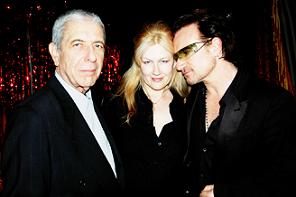
Leonard Cohen (left), film director Lian Lunson, and Bono.
Credit: Brit Marling.
It is said, according to Jewish tradition, that the age of prophets has come to an end. God, having withdrawn from the world, has also withdrawn his voice, leaving humans to stumble along in the dark, bereft of guidance. Notwithstanding these facts, it seems safe to call Leonard Cohen a prophet for the modern world. Cohen, the Canadian-born singer-songwriter who has achieved legendary status for songs like "Bird on a Wire," "Everybody Knows," and "Suzanne," knows it too, making reference to his own chosenness in the career-summing "Tower of Song": "I was born like this/ I had no choice/ I was born with the gift of a golden voice."
 |
Leonard Cohen on His First Influences |
 |
Leonard Cohen on Becoming a Monk |
 |
Rufus Wainwright Covers 'Everybody Knows' |
To begin with, Cohen's voice is itself an authoritative instrument. Golden it may not be, but its low, raspy rattle, teetering on the edge of utter tunelessness, is the sound of truth exposed in a wilderness of falsehood. The traditional Cohen song, in its primal state, sets Cohen's speak-singing against the ethereal voices of his female backup singers and the careful, assured picking of guitars. Cohen's prophecy is of impending doom, clothed only in the garb of his formal, biblically tinged language. His subject matter ranges from the purely spiritual to the political, but the result remains the same, especially in his later, gloomier iteration: irreversible chaos and death.
Walter Benjamin once remarked that the storyteller is defined by his wielding that most precious wisdom--the knowledge of death. By that reckoning, Cohen is the prophet as storyteller, his authority stemming from the confidence of his poetry, and his voice. "There's a mighty judgment coming/ but I might be wrong," Cohen sings on "Tower of Song" (1988), but by the time of "The Future" (1992), all doubt has been removed. "Things are going to slide, slide in all directions/ Won't be nothing/ Nothing you can measure anymore/ The blizzard, the blizzard of the world/ has crossed the threshold /and it has overturned/ the order of the soul."
The vision of the future is so bleak, detailed as it is in Cohen's precise, lengthy lyric, that the demons of the past come to seem preferable in comparison: "Give me back the Berlin wall/ give me Stalin and St. Paul/ I've seen the future, brother:/ it is murder." "The Future" is an update of the Book of Revelations for the post-Soviet era of moral confusion.
What is left, in the place of true spiritual intimacy with God, is the pursuit of some higher truth, and interminable waiting. He's "Waiting for the Miracle," as one of his songs describes it, and his lyrics portray the purgatorial limbo in which he finds himself while doing so: "Ah I don't believe you'd like it/ You wouldn't like it here/ There ain't no entertainment/ and the judgments are severe/ The Maestro says it's Mozart/ but it sounds like bubble gum/ when you're waiting for the miracle/ for the miracle to come."
Cohen has always been a spiritual seeker in addition to an end-of-times pessimist, a fact reflected in the mingled Jewish, Christian, and Buddhist references in his lyrics as well as his own time spent, in recent years, in a Buddhist monastery.
Perhaps no song so perfectly summarizes his mordant take on matters religious, his mingling of the sacred and profane--of love, sex, and spiritual hunger--as his "Hallelujah" (1985), famously covered by Jeff Buckley, and memorably featured everywhere from "Shrek" to "The West Wing" in recent years.
Echoing the Bible--and, buried deeper in the song's DNA, the Hasidic rabbis who once possessed the means of indirectly contacting God--"Hallelujah" begins with what is lost: "I heard there was a secret chord/ that David played and it pleased the Lord/ but you don't really care for music, do ya?" King David's love affair with Bathsheba, source of his most significant sin, is mingled with that of Samson, whose love for Delilah costs him his hair, source of all his strength. The once-ringing "hallelujah" of deep faith and profound dedication has become a "cold and broken hallelujah," and the glories of love have become ugliness and degradation.
But for Cohen, who would later describe his profession as "paying my rent every day at the tower of song," this is not all. "There is a crack, a crack/ in everything/ that's how the light gets in," Cohen sings in "Anthem." Similarly, as he says in "Hallelujah," there is a crack in language itself that allows the light in, and it no longer matters where we stand in the procession of history: "There's a blaze of light/ in every word/ It doesn't matter which you heard/ The holy or the broken Hallelujah."
As the female chorus' gospel-like Hallelujahs ring out, Cohen submits his final word on his profession, and his calling, declaring both its futility and its utter necessity: "I've told the truth, I didn't come to fool you/ And even though/ it all went wrong/ I'll stand before the Lord of Song/ With nothing on my tongue but Hallelujah."
In an era without prophets, Cohen is a prophet without honor, his only clothing the unshakeable belief that when he pleads with God (in the song "If It Be Your Will") that "If it be your will/ To let me sing," God will respond, "You must sing."

